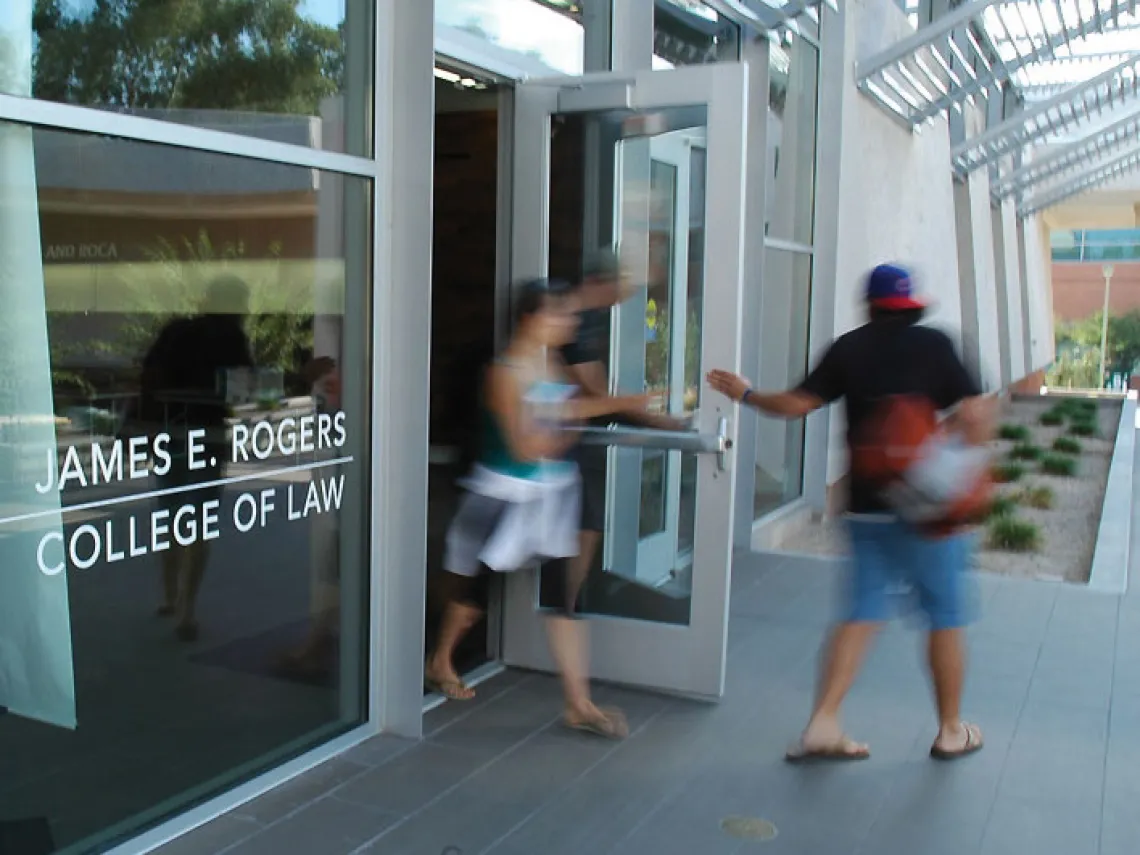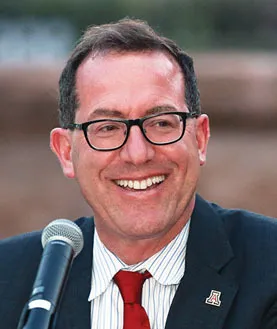Arizona Attorney Q&A with Dean Marc Miller Covers Access to Legal Services, 2020 Employment Numbers, COVID Recovery and More

Arizona Attorney Magazine
Updates from Arizona’s Law Schools
September 2021

University of Arizona Law Dean and Ralph W. Bilby Professor of Law Marc Miller discussed expanding access to legal services, legal innovation, student achievements, creating new paths for legal education and more in a Q&A with Arizona Attorney Magazine.
From Arizona Attorney Magazine:
What are a few significant new developments you’d like to share about your law school?
University of Arizona Law continues to create new paths for legal education, for diversifying the profession, and for expanding access to legal services.
We recently launched the third cohort of JD-Next, a free online law school preparation program we created for soon-to-be law school students across the country that teaches them how to read cases, analyze case law, and refine their writing skills. Nearly half of this year’s cohort are from underrepresented backgrounds. More than 1,900 students at 24 law schools are currently participating, and this year ETS, the organization that administers the GRE and, like Arizona Law, an organization committed to diversity and access in law and in higher education, joined as a sponsor of the program.
In 2016, we were the first U.S. law school to accept the GRE as an alternative test for general JD admission. Today, 70 law schools, including 12 of the top 15 institutions and a healthy mix of private and public schools, now accept the GRE in addition to the LSAT. When you consider the doors this opens for applicants everywhere, especially those from nontraditional backgrounds, it’s really remarkable, and something we take great pride in.
Both JD-Next and the GRE reflect research-based efforts to expand access to JD programs. But we also want to expand the opportunity to be trained in law to the many non-lawyers—odd as the idea of a “non-lawyer” is!—at the undergraduate, graduate and post-graduate levels.
One prominent example is our first-in-the-U.S. BA in Law degree for undergraduates. The BA in Law program continues to grow at a rapid pace on campus in Tucson, online, and on campuses around the world where we deliver dual undergraduate degrees with our global partners. For example, this fall we will have 450 students at Ocean University of China, in the beautiful city of Qingdao, studying for dual law degrees in Chinese and U.S. law.
We’re now seeing graduates here in the U.S. and around the world land at top law schools around the country, including our own. Others are finding success in law-related careers in health, business and government. From day one, the BA in Law has attracted a diverse set of students—around 60 percent women and 55 percent students of color in any given year and many first-generation students who are very proud to pursue a legal education.
On the JD employment front, we saw some of our strongest employment outcomes ever for the Class of 2020, despite the uncertain job market caused by the pandemic. Our overall employment rate at 10 months after graduation (the standard measured by the ABA) was the second highest it has ever been. Furthermore, our employment rate for full-time, long-term, JD-required or JD-advantage jobs was the highest it has ever been by five percent. We are still collecting and finalizing data for the Class of 2021, but so far the trends are very encouraging, and I fully expect to have stellar results on that class by this time next year.
What are your post-COVID reopening plans?
The University of Arizona is planning for mostly in-person classes this fall. And the vast majority of our in-person community— returning and new students, staff, full-time and part-time faculty—are thrilled to return to a more familiar, three-dimensional setting. I should note that quite a few colleagues have been back since August 2020, including our library and IT teams.
There is a reality beyond the welcome return to in-person learning. In many ways we do not yet fully appreciate, there is no going completely back to the world we knew before COVID. I think the same point applies broadly to the practice of law in many settings.
So while we are looking forward to returning to campus, we also know that much of what students, faculty, staff and the community expect has changed dramatically, and that we need to continue adapting and anticipating future changes. Multiple learning modalities, flexible work arrangements, tech forward operations, and connecting virtually with more people outside our physical location—whether for job interviews or externships, or to bring in more speakers (and participants) to classes and lectures—are all new norms that I believe are here to stay.
Arizona is one of a few states changing law practice rules to allow limited nonlawyer practice. Do law schools play a role in this historic development? Is your school aiding in their education?
This development is aligned with work the University of Arizona has been leading for years, and we’ve been closely involved in these efforts. Our college houses the first pilot in the U.S. to train non-lawyers in the non-profit sector to provide limited scope legal advice. Professor Stacy Rupprecht Jane, director of our Innovation for Justice program and an access to justice leader, was on the Arizona Supreme Court task force that explored this issue and ultimately recommended the creation of a new tier of legal service providers.
Because we have previously innovated with the nation’s first undergraduate (BA) law degree, a wide variety of Master of Legal Studies (MLS) concentrations available to non-lawyers, and robust online offerings, we were able to quickly launch a Legal Paraprofessional concentration in our Master of Legal Studies program. Professionals who only need a few additional courses to sit for the licensure exam also may be able to enroll as non-degree seeking students. Working closely with the Arizona Supreme Court, we have plans to add additional tracks at both the undergraduate and master’s levels in the near future.
Our Legal Paraprofessional offerings have already drawn strong interest from professionals across the state, and the University of Arizona is incredibly supportive, including funding the hire of a dedicated and experienced program coordinator to make this program a success for students and for the state. Our aim is to set the benchmark for legal education across this and every program we offer.
There is a massive unmet demand for legal services in Arizona, and we believe law schools play a critical role in closing that gap. If you look at the medical field, with physicians, nurses, nurse practitioners, pharmacists and many other specialized health professionals, each with specific training and services offered, this expansion makes perfect sense and will ultimately better serve the community. We’re excited to be a part of that.
